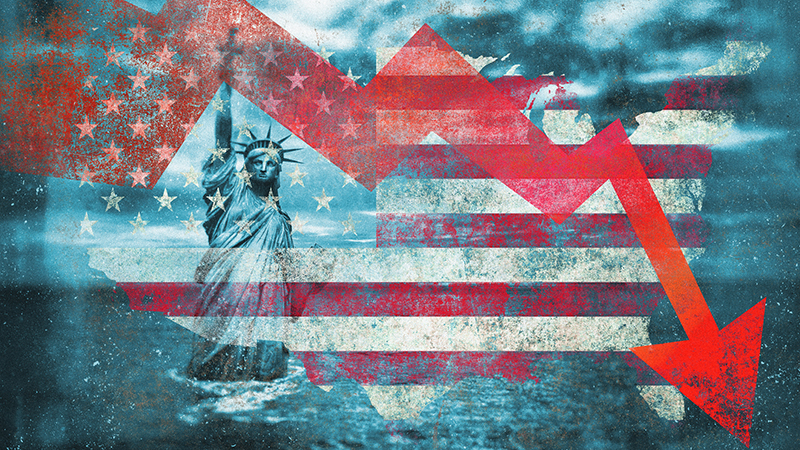
Joe Biden might be confident in the US economy. Federal Reserve Chairman Jerome Powell might be confident about the US economy. But the average American? Not so much.
The Conference Board Consumer Confidence Index fell for the second straight month in February, dropping from a downwardly revised 106.0 in January to 102.9.
The projection was for consumer confidence to tick up to 108.5.
The Expectations Index—based on consumers’ short-term outlook for income, business, and labor market conditions—fell to 69.7 from a downwardly revised 76.0 in January. It was the lowest reading since July 2022.
According to the Conference Board, an Expectations Index below 80 “often signals a recession within the next year.” That index has been below 80 for 11 of the last 12 months.
Only 14.2% of consumers think business conditions will improve over the next six months. That was down from 18.4% in January.
The Conference Board said there are other signs that a recession could be looming.
Consumers may be showing early signs of pulling back spending in the face of high prices and rising interest rates. Fewer consumers are planning to purchase homes or autos and they also appear to be scaling back plans to buy major appliances. Vacation intentions also declined in February.”
“If consumers drive the economy, the outlook for 2023 is bleak, as the consumers expect that the worst is yet to come,” FwdBonds spokesperson Chris Rupkey told CNN. “Coming on the heels of a gigantic 517,000 new payroll jobs report in January, current conditions especially in the labor market look great, but the future path of the economy is very much in doubt.”
Consumers are more upbeat about jobs. This isn’t surprising given the constant talk about a strong labor market. The number of consumers saying jobs are “plentiful,” was up to 52% in February from 48.1% the prior month.
But as we have reported, you should take these government labor reports with a grain of salt. In the first place, many of the “new jobs” represent people taking on extra work to make ends meet in this inflationary environment. In the second place, the government has played fast and loose with seasonal revisions. As SchiffGold analyst Tony noted in his overview of the job numbers, perhaps it’s time to take the letter “L” out of BLS.
How can anyone look at the environment and then take such a job report seriously? This is the type of job report you would see at the height of an economic cycle where the economy is firing on all cylinders. The BLS numbers are already hard to take at face value.”
Price inflation expectations for the year ahead improved modestly in February, falling to 6.3% from 6.7%. This generally reflects the change in CPI. It’s also important to note that this is significantly above the Fed’s mythical 2% target and indicates consumers have no faith that the Fed is going to win the inflation fight in the next 12 months.
In other words, it appears consumers expect economic conditions to deteriorate over the next year, but that price inflation will remain elevated.
Consumer confidence still hasn’t recovered to pre-pandemic levels. In the three to four years prior to the pandemic, the consumer confidence index generally ranged above 120.
Given the American consumers’ reliance on debt, it’s no wonder their confidence is falling as interest rates continue to rise. Total household debt charted the biggest rise in 20 years in the fourth quarter of 2022.
Sagging consumer confidence is yet another sign that no matter how the politicians and pundits spin it, the economy is a house of cards teetering on the verge of collapse. The economy was built on easy money and debt. With the Fed taking the easy money away and debt at record levels, it’s only a matter of time before it collapses.
And American consumers know it.
Infowars Was Right Again COVID Admittedly Leaked from Wuhan Lab
Source: News Wars Rephrased By: InfoArmed
